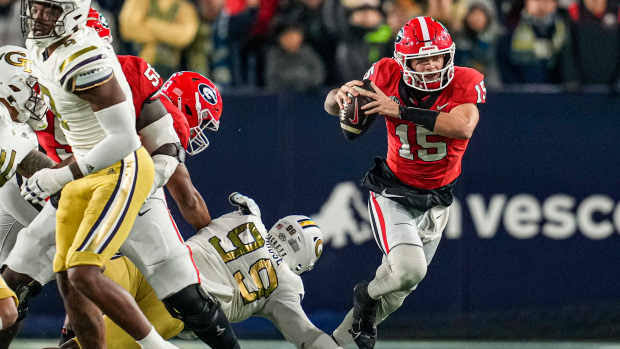Georgia Tech entered their Week 14 matchup against No. 7 Georgia determined to make history by securing their third win over a Top 10 team in the 2024 college football season. The Yellow Jackets had already cemented their reputation as giant killers earlier in the year, starting with a dramatic upset over then-No. 10 Florida State in their season opener. They followed that by stunning then-No. 4 Miami on November 9 with a hard-fought 28-23 victory. Facing their in-state rival Georgia, the stakes were as high as the tension at a sold-out Sanford Stadium, and Georgia Tech appeared ready for the challenge.
A First-Half Statement
From the opening whistle, the Yellow Jackets showed they were not intimidated by Georgia’s lofty ranking or the boisterous crowd. Their aggressive approach paid dividends early, as quarterback Haynes King spearheaded an efficient offensive attack. King showcased his dual-threat capabilities, rushing for a touchdown and throwing a perfectly timed pass for another score.
The Yellow Jackets’ defense was equally impressive, smothering Georgia’s high-powered offense and forcing the Bulldogs into uncharacteristic mistakes. By halftime, Georgia Tech held a commanding 17-0 lead, a testament to their well-executed game plan and relentless effort. The Bulldogs, who had been widely expected to dominate, found themselves in unfamiliar territory as frustration grew on the sideline and in the stands.
Georgia’s Comeback and the Role of Officiating
While the first half belonged to Georgia Tech, the second half saw Georgia slowly chip away at the deficit. By the fourth quarter, the Bulldogs had managed to cut the lead to 20-6. Then came the game’s most controversial moment, a play that would ignite fierce debate and dominate discussions long after the final whistle.
Facing a critical fourth-and-goal situation from Georgia Tech’s four-yard line, Georgia quarterback Carson Beck fired a pass into the end zone. Initially, it appeared incomplete, sparking celebrations among Georgia Tech players and fans. However, those celebrations were short-lived as a flag was thrown, and Yellow Jackets defensive back Omar Daniels was called for pass interference.
The call immediately drew sharp criticism. Replays suggested Daniels was making a legitimate play on the ball, and many argued that the pass had been tipped at the line of scrimmage, which would have negated the interference penalty. Social media erupted with outrage. “The refs seriously DID NOT just bail out Georgia on that pass interference,” one fan wrote, encapsulating the sentiments of many. Another added, “Horrible call. That ball was tipped, and there was no PI. These refs have bailed Georgia all night.”
The penalty gave Georgia a fresh set of downs, and the Bulldogs capitalized two plays later with a touchdown, narrowing the score to 20-13. The momentum shift was palpable, and Georgia Tech suddenly found themselves on the back foot.
Targeting Controversy and Momentum Shift
As the clock ticked down in the fourth quarter, Georgia Tech still clung to a 27-20 lead. But the game took another controversial turn when Yellow Jackets quarterback Haynes King was hit hard by Georgia defensive back Dan Jackson, forcing a fumble that the Bulldogs recovered. The hit raised immediate questions about whether targeting should have been called. Replays appeared to show Jackson leading with his helmet and making contact with King’s chest, a clear violation of targeting rules. However, no penalty was assessed, leaving Georgia Tech fans furious and adding to the growing perception that the officiating was favoring Georgia.
The turnover proved costly for the Yellow Jackets. Georgia quickly marched down the field on their ensuing possession and tied the game at 27-27. Social media was again flooded with criticism. “Of course this isn’t called targeting because it benefits Georgia,” one fan lamented. Another commented, “He launched his head straight into the chest of Haynes King. How is that not targeting?”
The non-call only added fuel to the fire, as fans and analysts alike questioned the consistency and integrity of the officiating in such a crucial game. For many, these moments overshadowed the thrilling action on the field.
A Battle Overshadowed by Controversy
Despite Georgia Tech’s impressive start and valiant effort throughout the game, the focus shifted to the officiating decisions that many felt unfairly impacted the outcome. The Yellow Jackets had entered the game with confidence and executed a near-perfect first half, but the combination of Georgia’s second-half resurgence and questionable officiating ultimately proved too much to overcome.
The game left fans and pundits debating not only the officiating but also broader issues regarding accountability and fairness in college football. Many felt the controversial calls robbed Georgia Tech of what could have been a signature victory and tarnished what should have been an exciting, competitive rivalry game.
A Season of Highs and Lows
For Georgia Tech, the loss was undoubtedly heartbreaking, but it didn’t erase the accomplishments of their season. The Yellow Jackets had proven themselves capable of competing with and defeating some of the nation’s best teams. Their victory over Florida State in the season opener set the tone for a campaign defined by resilience and grit. Similarly, their triumph over Miami demonstrated their ability to rise to the occasion in critical moments.
Even in defeat, Georgia Tech showed they could go toe-to-toe with a Top 10 opponent on one of college football’s biggest stages. While the officiating decisions will continue to be a topic of heated debate, the Yellow Jackets can take pride in their performance and use it as motivation moving forward.
As for Georgia, the win keeps their postseason hopes alive, but it comes with a cloud of controversy that may follow them into the coming weeks. For both teams, this game will be remembered not only for its on-field drama but also for the lasting questions it raised about officiating and its impact on the sport.
